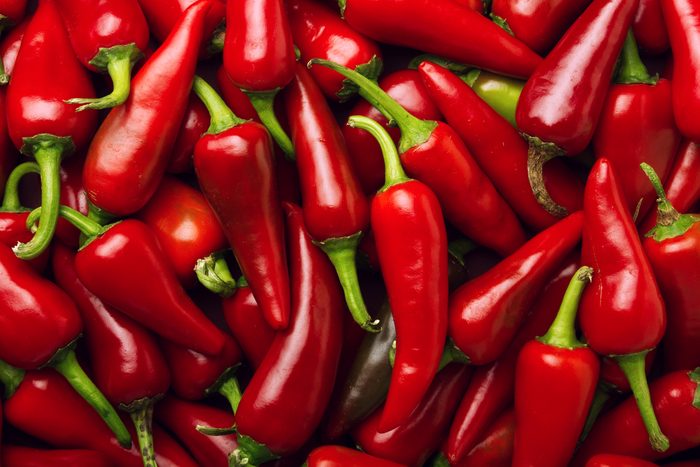
Chowing spicy stuff
If you’re a late-night snacker, stay away from the salsa and chips. You may even want to avoid spicy foods at dinner if you have trouble sleeping. Hot peppers and other spicy ingredients can cause acid reflux and digestive upset, especially if you eat them close to bedtime. But Amanda Kostro Miller, RD, an advisory board member for Family Living Today, explains another reason spicy food could prevent you from sleeping well: “Capsaicin, a substance in most spicy peppers, can increase your internal body temperature, but your body temperature needs to drop when you’re falling asleep.”
Instead of dousing your meal in hot sauce, add some mild guacamole. Avocados are rich in unsaturated fats which can raise levels of serotonin, a neurotransmitter that plays a role in sleep regulation. Plus, avocados contain magnesium, a mineral that can promote more restful sleep. Here are some more powerhouse benefits of avocados.
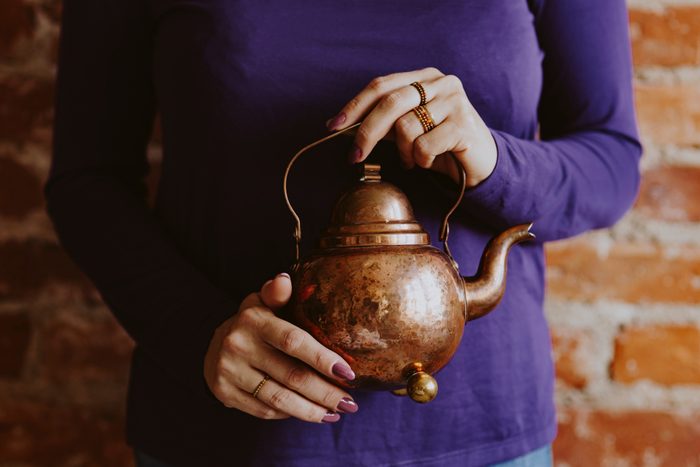
Drinking peppermint tea
While that cup of peppermint tea may seem like a soothing bedtime ritual, it could be causing some tossing and turning. Peppermint relaxes the muscle that separates your stomach and your esophagus, which can cause stomach acid to rise into your chest and throat. This could cause heartburn and discomfort—not exactly sensations conducive to asleep.
If you enjoy your evening herbal tea, switch to one that has evidence for helping to promote rest and relaxation: Lavender tea has shown potential in helping postpartum women reduce fatigue and depression. And it could be partly the smell of it. Lavender aromatherapy with essential oils or candles can also help with stress reduction. Here are more super useful essential oils, and how to blend them.
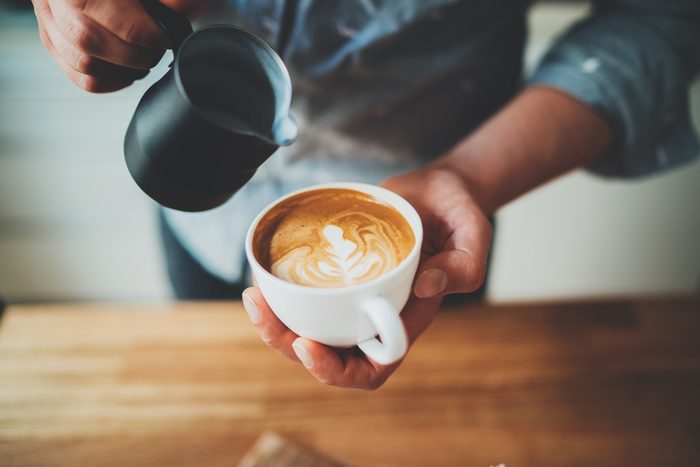
Downing coffee or tea
Caffeine is a stimulant that raises your heart rate, says Rebecca Shenkman, MPH, RDN, is the director of the MacDonald Center for Obesity Prevention and Education at Villanova University‘s College of Nursing. “Caffeine can potentially stay in the bloodstream for up to 6 hours after consumption,” she says, pointing to research indicating that daily caffeine may disturb sleep leave you feeling tired during the day.
A better evening option would be an herbal drink, like chamomile tea: According to Mary Purdy, a registered dietitian and Clinical Education Lead at Arivale, there is evidence that chamomile tea may be helpful in promoting better sleep, especially in postpartum women. “Whether it’s a placebo effect or not, having a peaceful routine in the evening may help set the brain up for a more peaceful slumber,” Purdy says. Thinking of trying melatonin? Here’s what happens to your body when you do.
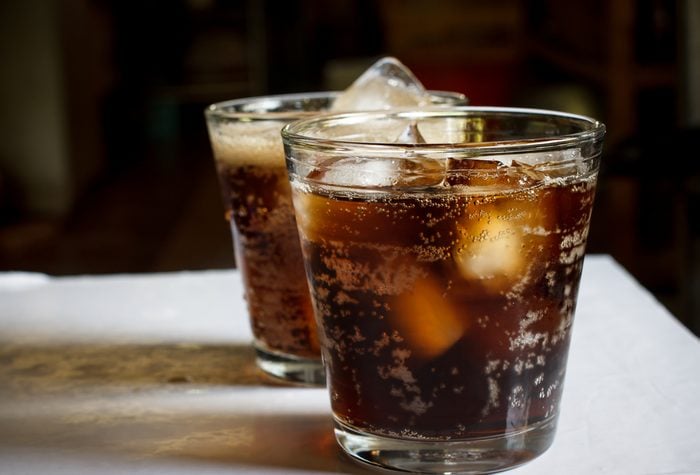
Indulging in pop
Not only is most pop loaded with sugar, which can spike your blood glucose level—a condition that will not promote sleep. In addition, many varieties are also high in caffeine. That’s a double whammy when it comes to sleep disruption. Studies indicate that caffeine actually binds to receptors in the body that can disrupt the sleep/wake cycle, Purdy points out. She also emphasizes that genetically, some people process caffeine more slowly than others. If you think you might be sensitive to caffeine, it’s best to stop drinking caffeinated beverages much earlier in the day—possibly before midday.
While it’s not the same thing, a warm cup of milk before bed can really help, Shenkman says. It delivers two substances that promote sleep: “With the potent combination of tryptophan and melatonin, milk can be both soothing and sleep promoting,” says Shenkman. You should also read up on the ways Daylight Saving Time is ruining your sleep.
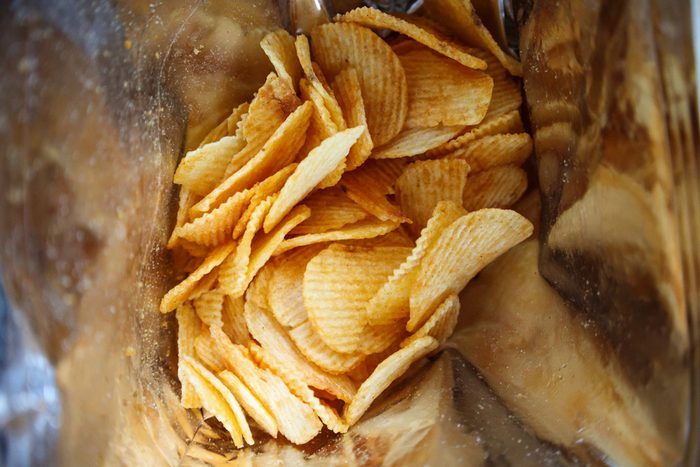
Snacking on junk
Low in fibre, high in saturated fat, and loaded with sugar—junk food like donuts and chips spell disaster for a good night’s sleep. According to Kimberly Gomer, RD, Director of Nutrition at the Pritikin Longevity Center, studies suggest eating low-fibre, high saturated fat and sugary foods was associated with lighter, less restorative, more wakeful sleep.
No surprise that fruit is a much better option if you want a snack before bed—and kiwis might be the best. Research suggests that kiwi fruit can increase total sleep time and sleep quality, and shorten the amount of time it takes to fall asleep. Part of the reason for this benefit could be the fruit’s high antioxidant content (kiwis are an excellent source of vitamin C) and serotonin-boosting effects, says Ofer Jacobowitz, MD, PhD, a sleep surgery and sleep medicine specialist.
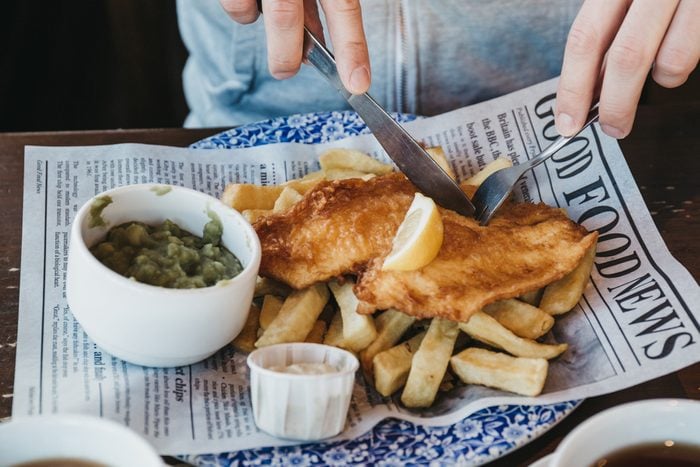
Eating a greasy meal
Have you ever had fish and chips and felt like you swallowed a rock? Deep-fried foods are famously tough to digest. Fat slows the rate of gastric emptying—so food stays in your stomach longer. Dietician Kostro Miller points to research suggesting that fatty foods can disrupt your sleep and your internal body clock (your circadian rhythm), leading to daytime sleepiness and late-night hunger.
Think instead of a meal that induces sound sleep—Thanksgiving. Turkey, chicken, and fish all have tryptophan, an amino acid that boosts serotonin. For even more sleep-boosting potential, serve a sweet potato alongside. You’ll get a slow, steady release of carbohydrates to further boost serotonin. Plus, sweet potatoes are rich in potassium, which can help promote muscle relaxation. Your diet is just one of the innocent habits that could be ruining your sleep.
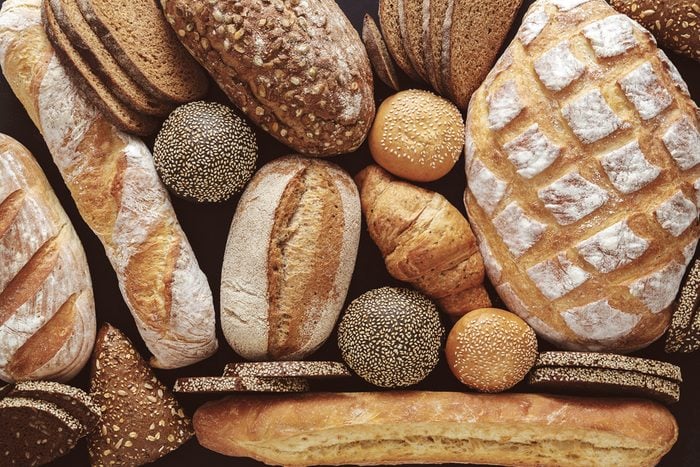
Noshing on white bread
It’s not only excess sugar that can disturb sleep—eating refined carbohydrates such as white rice, pasta, crackers, and bread can do the same thing, says Purdy. These foods can disrupt the “deep sleep” stage, due to blood sugar fluctuations, and they may also cause energy dips throughout the day that can interfere with the body’s circadian rhythm.
You don’t have to avoid bread completely: Minimally processed carbohydrate-rich foods—brown rice, whole grains—are high in fibre; that can help keep your blood sugar from spiking, while you take advantage of the good carb boost: melatonin production.
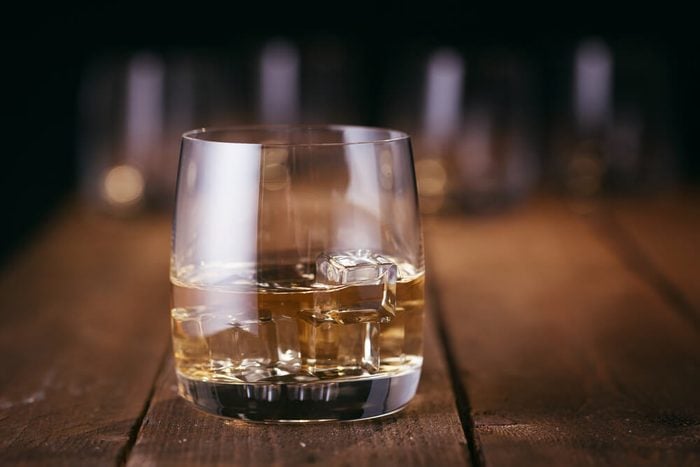
Having a nightcap
It might help you fall asleep, but booze will most likely wake you up a few hours later. “Research on alcohol and sleep suggests that drinking more than the recommended amount of two standard serving drinks for men and one standard drink for women can prevent falling into the deep stage of sleep,” warns Shenkman.
If you’re looking for something to replace that night cap, try tart cherry juice. The fruit contains melatonin, a natural hormone that helps balance your circadian rhythm. Cherries are also rich in phytochemicals that have anti-inflammatory properties. “Studies have shown that cherry intake or tart cherry juice intake can increase total sleep time, sleep efficiency, and shorten the time it takes to fall asleep,” Dr. Jacobowitz says.
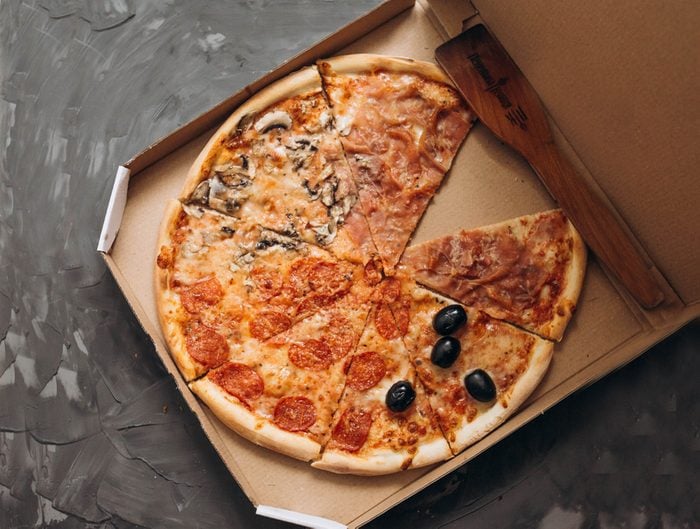
Eating cold pizza
It’s a popular late-night snack, but it will do a number on your sleep. You already know the sleep issues with white flour (crust) and cheese (saturated fat), but add to this the acidity of tomato sauce and you’re looking for trouble, says Terry Cralle, RN, a certified clinical sleep educator and Saatva sleep consultant. “Pizza’s high-fat cheese and acidic tomato sauce can trigger the production of acid in the stomach and lead to sleep-inhibiting acid reflux [heartburn], making this popular nighttime dish a no-no before bed.” Heartburn is just one of the health conditions that could be messing with your sleep.
While abstaining from pre-bedtime snacks is your healthiest choice, if you must, go for low-fat protein (say, turkey breast) paired with whole grain crackers. Lower fat cheese substitutions might include part-skim mozzarella, light cheddar, or ricotta.
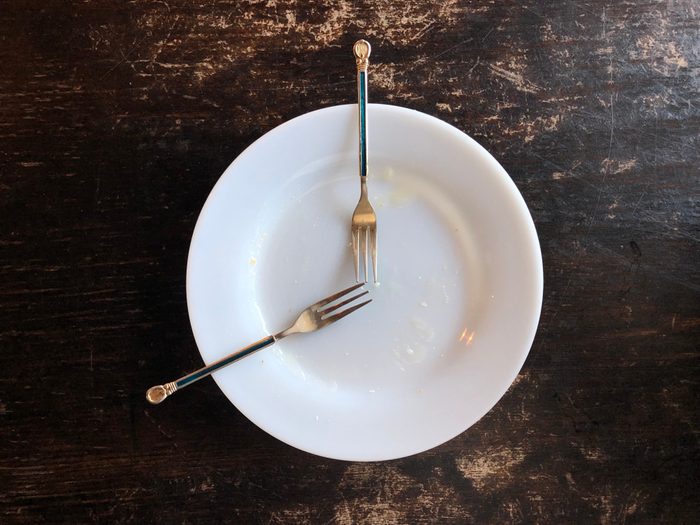
Eating dinner late
While it’s common for dinner to be the largest meal of the day, it isn’t the healthiest habit, especially if you’re sitting down to dinner after, say, 8 p.m. An overly full stomach spells disaster when it’s time to sleep, says Shenkman. Research indicates that lying prone soon after eating a large meal will delay proper digestion. This can lead to heartburn and physical discomfort in your belly, which makes it difficult to fall and stay asleep, she says.
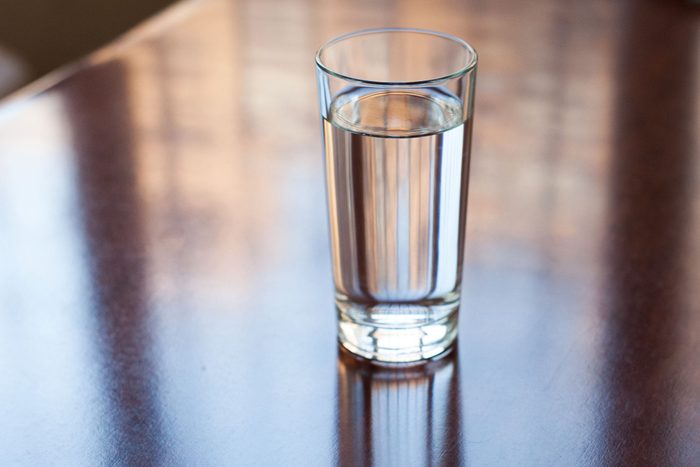
Drinking too much water
Evenings are the one time of day health experts recommend slowing down on the hydration. Drinking too much fluid—whether it’s water, herbal tea, or soup—makes it more likely you’ll need to wake up to pee in the middle of the night. Frequent waking means you could miss out on restorative sleep cycles, which will leave you feeling tired the next morning. Here are 9 more things that happen to your body when you get a full 8 glasses of water a day.
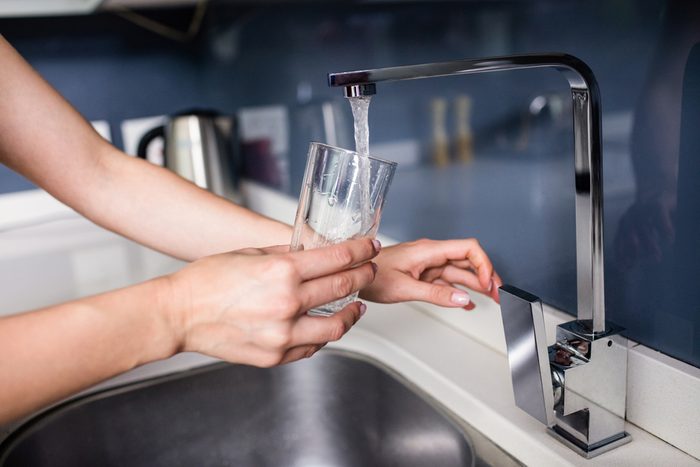
Not drinking enough water
Cutting down on fluids before bed doesn’t mean you want to dry yourself out entirely. Make sure you get plenty of water throughout your day, says Shenkman: “Dehydration can lead to leg cramps, dry mouth, and a parched throat which can disrupt sleep.”
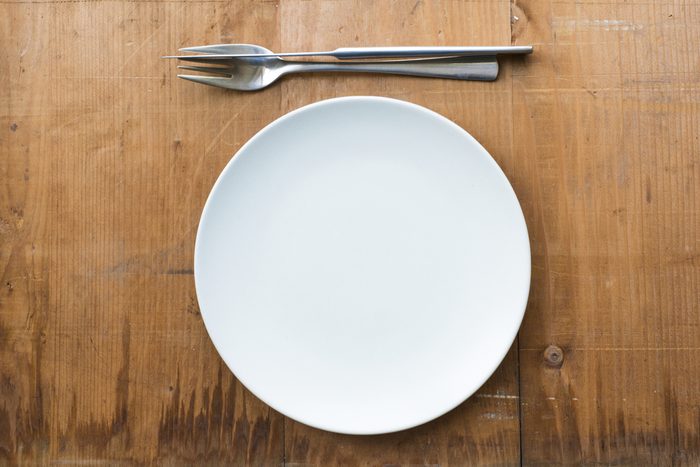
Skipping meals
Yes, a full stomach can prevent you from sleeping well, but so can failing to eat enough, says Purdy. Research suggests you may miss out on enzymes and nutrients your body needs to produce sleep-inducing substances in the body, she says. Plus: “Skipping meals during the daytime can have a negative effect on blood sugar balance, which may lead to nighttime waking and disrupt the circadian rhythm.” Thinking about trying the keto diet? Make sure you know the hidden dangers first.
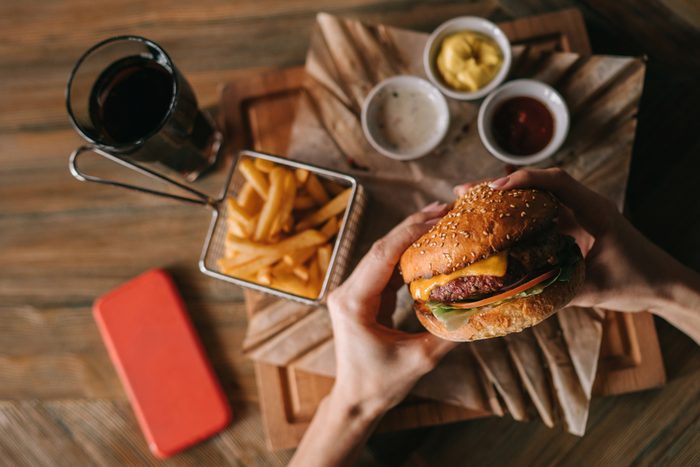
Eating a high-fat diet
According to Dr. Jacobowitz, studies are pretty clear on this: “High-fat diets have been associated with reduced slow wave [deep] sleep and reduced REM sleep.” Just be careful not to replace fat with simple carbohydrates like those in white rice, pasta, and white bread: High carbohydrate diets are also linked with worse sleep. These poor sleep habits could be raising your risk of Alzheimer’s.
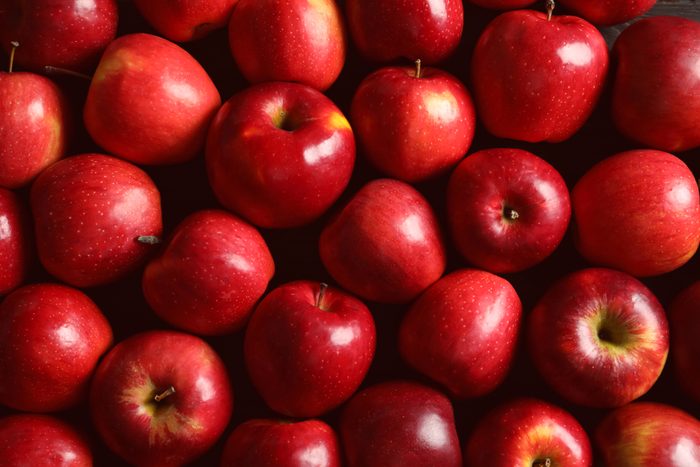
Missing out on fibre
People who don’t get enough fibre in their diet tend to sleep poorly compared to those who get plenty of fibre, finds a study published in the Journal of Clinical Sleep Medicine. Interestingly, the researchers report that just one day of low-fibre eating can disrupt sleep. When participants followed a higher fibre plan, they fell asleep almost twice as quickly and slept sounder throughout the night. Here’s what a psychologist suggests you do for insomnia.
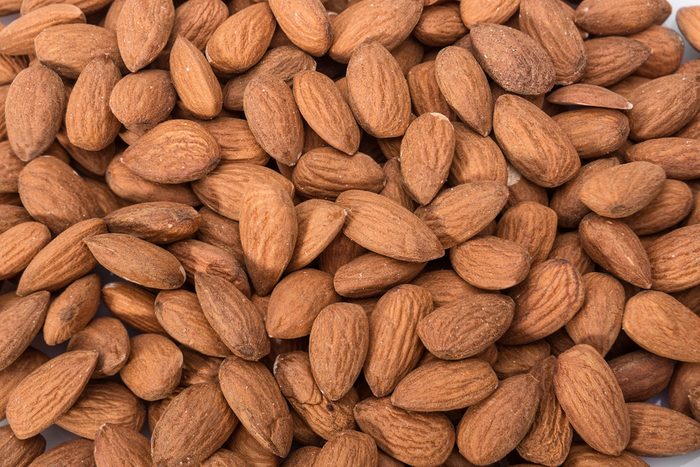
Failing to get enough protein
You don’t have to follow a high-protein plan to sleep well, but you should make sure you’re getting enough of this macronutrient essential for maintaining muscle mass and strength. As Purdy explains, protein helps balance blood sugar and keep you feeling full; research suggests it can also provide building blocks for the synthesis of serotonin and melatonin. To make sure you’re getting enough protein, try to include a serving of protein-rich food at every meal and snack. This could be a couple of eggs at breakfast, lentil soup at lunch, a handful of almonds for a snack, and 3 to 4 ounces of chicken or fish at dinner. Next, make sure you’re not missing these silent signs of sleep apnea.
